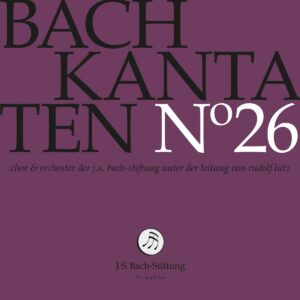Step by lively step, the St. Gallen Bach Foundation’s cantata series moves ahead with its sneakily magnificent releases. One of the latest efforts, Volume 26, features the usual qualities: Unspectacular, buoyant, deeply felt readings with fine singers with clear, natural voices.
BWV 25 opens the proceedings with its sighing, teeth-gnashing stepped introduction in the violins—in a tangy minor mode that belies the E major on the written page. The tug and pull leads to a constant repetition of “There is naught of soundness about my body before thy dire anger, nor any rest in my bones in light of my sins” in the chorus—operating in free counterpoint to the double fugue to the chorale in the brass with three trombones and a horn. The severity of the opening movement benefits from director Rudolf Lutz’s deliberate tempos (Gardiner and Suzuki opt for even slower ones, to similar effect).
Indeed, the whole cantata, set to an explicit libretto that graphically compares our physical ills as analogue to our inevitable, original sin, exudes gravity, until the elegantly clarion-voiced Joann Lunn invokes the curative powers of Jesus (“O Jesu, lieber Meister”), who—so the unknown librettist tells us—is just the physician that the human condition has been calling for. Three flutes enter with her into the ensuing aria.
BWV 162 “Ach, ich sehe, itzt, da ich zur Hochzeit gehe” is an earlier Weimar work here performed in the Leipzig revision that adds a baroque sliding trumpet in the opening aria, and with the flute part a then 20-year-old Masaaki Suzuki reconstructed for the soprano aria (Gerlinde Sämann) back in 1974. Alto Terry Wey is his velvety-expressive self and Charles Daniels is in excellent, relaxed form, cumulating in their extensive Duetto before the Chorale. Altogether the cantata is a beacon of lightness between the predecessor and another one of Bach’s darker (and longer) cantatas, BWV 94 “Was frag ich nach der Welt” (“What has this World to Give” but that might also be translated as “What do I seek worldly riches for?”).
The Lutz cantata cycle isn’t generally known for star-studded casts of singers, but you can’t actually do much better for a quartet of soloists these days (or in 2014, at the time of the recording) than the lineup here. Nuria Rial, Margot Oitzinger, Daniel Johannsen, and Dominik Wörner are exemplary for a Bach-cast born in the ’70s, all at the height of their powers if probably not yet at the height of their fame. The fascinating text with its use of bracketing (opening lines are also the closing lines, just like the opening chorus’ text is also the text of the closing chorale) can be understood in every detail, thanks to the excellent articulation. The concluding, book-ending chorale is so calmly, reassuringly executed, it feels as though the nimble St. Gallen chorus (6-5-5-4) was collectively closing its eyes on the last notes. The sound here, as in the two 2017 recordings, is very fine. The only way you could tell these are live recordings is from the sense of everyone being in the moment. Excellent notes, as usual, round out this gratifying release.
































